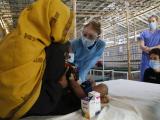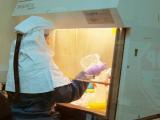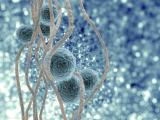Jan 8, 2003 (CIDRAP News) The London arrests Sunday (Jan 5) of six men and yesterday of a seventh in connection with discovery of the highly toxic material ricin have British physicians on the alert for signs of poisoning and citizens being reminded by officials to be "alert but not alarmed." The situation has heightened interest elsewhere, as ricin is among the agents considered as likely agents of bioterrorism.
The arrests, made by antiterrorism police, came after an intelligence tip-off. Found in an apartment in north London where one of the men was arrested were a small number of caster oil beans, from which the toxin is distilled, as well as a number of pieces of laboratory glassware and chemicals used in producing ricin. All of the suspects are in their teens or early 20s.
Ricin, a di-chain ribosome-inactivating protein from the bean of Ricinis communis, the castor plant, is listed as a Category B critical biological agent by the Centers for Disease Control and Prevention, meaning it is moderately easy to disseminate and is a moderate threat as a potential agent of bioterrorism. It can be produced as a liquid or a powder and can be deployed in a variety of ways: sprayed as an aerosol, added to food or beverages, smeared on environmental surfaces, or injected. The aerosol route is deemed the most likely for use by bioterrorists because of the more widespread dissemination possible.
Illness usually begins with flulike symptoms (fever, stomach ache, diarrhea, vomiting), progressing to organ and immune system failure and finally death. There is no treatment (ricin acts directly on lung parenchyma after inhalation and is quickly distributed to viral organs after parenchymal exposure, making postexposure therapy difficult) and no currently available vaccine. However, active investigation of a vaccine is under way with the increasing recognition of ricin as a potential bioterrorism agent. Two recent studies of vaccination in mice (see below) show promising results, and the DOR BioPharma company is working with the University of Texas Southwestern Medical Center on licensing the first recombinant ricin A chain mutants vaccine, intended to protect humans from aerosolized ricin.
Castor beans have been known since ancient times to be highly toxic. Ricin's lethal toxicity is about 1,000-fold less than that of botulinum toxin, but it is heat-stable and castor plants are grown worldwide, which makes it a more likely agent of bioterrorism, according to the US Army Medical Research Institute of Infectious Diseases (USAMRIID) (see below).
Ricin is among the poisons UN inspectors leaving Iraq in 1998 considered among Saddam Hussein's arsenal. In addition, it was found by US troops in caves in Afghanistan.
For more information on vaccine:
Kende M, Yan, C, Hewetson J, et al. Oral immunization of mice with ricin toxoid vaccine encapsultaed in polymeric microspheres against aerosol challenge. Vaccine 2002 Feb;20(11-12):1681-91 [Abstract with link to full text]
Smallshaw JE, Firan A, Fulmer JR, et al. A novel recombinant vaccine which protects mice against ricin intoxication. Vaccine 2002 Sep;20(27-28):3422-7 [Abstract with link to full text]




















